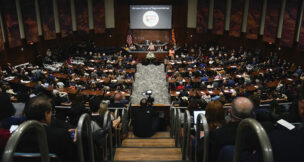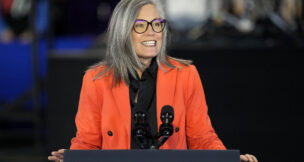Goldwater takes judicial retention case to Supreme Court
Howard Fischer, Capitol Media Services//December 3, 2024//
Goldwater takes judicial retention case to Supreme Court
Howard Fischer, Capitol Media Services//December 3, 2024//
An organization that lobbies and litigates for limited government regulation wants the Arizona Supreme Court to give Maricopa County voters more say in who serves on the state Court of Appeals.
But lawyers for the Goldwater Institute contend it’s more fair, even though it would decrease the strength of those in the state’s other 14 counties.
In new filings, attorneys for the group said decisions by the appellate-level court have statewide precedent. In fact, they said, these rulings end up being the law of the land in 99% of the cases, as only a handful ever are accepted for review by the Supreme Court.
But they pointed out that the current system, which limits who can vote for which judges when they come up for retention every six years, is based on the residency of the voter. Conversely, they said, it also means that any specific case could be decided by a panel of judges for whom the parties never had a chance to vote.
None of that impressed Maricopa County Superior Court Judge Frank Moskowitz who threw out the claim earlier this year.
He rejected arguments that the system under which residents of certain counties get to vote for certain appellate judges violates state constitutional provisions guaranteeing free and equal elections. And Moskowitz said each resident has the same rights to vote – even if they don’t get to decide whether to retain each judge on the appellate court.
Now the Goldwater Institute wants the state’s highest court to take a look.
The basic facts are not in dispute.
There are two divisions of the court, one which covers eight counties and one which covers seven.
But the voting procedure, set up by the Legislature, is even more complex than that.
In Division 1, of the 19 judges, 10 are residents of Maricopa County and it is only residents of that county who decide their future. Five are from the remaining counties in the division — Yuma, La Paz, Mohave, Coconino, Yavapai. Navajo or Apache — and voted on only by residents of those counties, with four elected at large from all nine counties.
A similar situation exists in Division 2, with four judges elected from Pima County, races in which only Pima residents can vote.
There are two judges from either Pinal, Cochise, Santa Cruz, Greenlee, Graham and Gila counties whose names appear only on the ballots in those six counties.
And voting for at-large judges depends on the residence of those judges.
Yet, as the Goldwater lawyers pointed out, cases to the appellate court are assigned pretty much at random. So it’s possible that a case out of Yuma County will be heard by three judges in Division 1, none of whom were not elected by residents of that county.
In fact, the situation has become more complex now that the Supreme Court has issued an order saying that cases actually can be transferred between divisions to even up the workload. That, for example, is how Kari Lake’s appeal of her Maricopa County lawsuit challenging the results of the 2022 gubernatorial race ended up at Division 2.
Goldwater contends all that violates a state constitutional provision which says the right to vote shall “equally belong to all citizens.”
“The statute discriminates among Arizona voters based on their county of residency, resulting in unequal voting privileges,” its legal papers tell the Supreme Court. And it says the numbers bear that out.
The lawyers say that the 2.4 million registered voters in Maricopa County get to vote on retaining an appellate judge from Maricopa County. But the other 640,000 or so voters in Division 1 do not, nor do any of the million voters in Division 2.
Conversely, the electoral fate of an appellate judge from rural parts of Division 2 is decided by fewer than 430,000 registered voters “while the state’s remaining 3.7 million voters have no vote – even though all Arizonans are governed by the judge’s decision.”
The flip side of all of that, however, is that if Goldwater wins the lawsuit, all voters from all counties will get to decide whether appellate judges, all of whom are appointed by the governor, get new terms in office. And given the voter registration figures cited in the legal papers, that allows for dominance by Maricopa voters.
In fact, that possibility was cited by Gov. Katie Hobbs last year when she vetoed an effort, backed by the Goldwater Institute, to repeal the current system of electing appellate judges and replacing it with a statewide vote. The governor wrote that such a system “would unfairly dilute the votes of those Arizonans most directly impacted by each division’s judges.”
That sent Goldwater to Maricopa County Superior Court where Moskowitz tossed the lawsuit saying there is no basis for the claim of constitutional impropriety.
“There are no allegations about votes not being properly counted, ballot access restrictions, intimidation or threats of violence, or any other influence that would deter a voter from exercising free will, or that each vote is not given the same weight as every other ballot,” the trial judge wrote.
Instead, he said Goldwater’s claim that the current system is a violation of equal rights for voters was made on a mere “conclusory allegation” – unsupported by facts – that the system used to determine whether appellate judges get a new term is unconstitutional. And Moskowitz said that falls short of what is needed for a lawsuit in Arizona.
Beyond that, the judge said the fact that all Arizonans can’t vote for all appellate judges who might be hearing a case is not a constitutional violation.
He pointed out that the Arizona Constitution says that any retired justice or judge of the Supreme Court, Court of Appeals or any county superior court who is drawing retirement pay “may serve as a justice or judge in any court.”
“And no voter will ever vote for them,” Moskowitz wrote, saying Goldwater is not claiming that is illegal.
He also pointed out that the Arizona Constitution allows the chief justice of the Supreme Court to assign appellate and trial judge to serve in other courts or counties. So, for example, Moskowitz said the chief justice could assign a Pima County Superior Court judge to serve on pending cases in Division 1 of the Court of Appeals.
“When that Pima County Superior Court judge subsequently comes up for a retention election in Pima County, all the voters in the Division 1 counties … would be treated equally – none would be able to vote in the retention election of that Pima County Superior Court judge who had decided a case as a judge on Division 1 of the Court of Appeals,” Moskowitz wrote, regardless of who that case affected and where they live.
Even if Goldwater is successful, it would void only part of the law about who gets to vote for which judges. The lawsuit does not challenge other provisions allocating slots on the Court of Appeals based on where judges live.














































